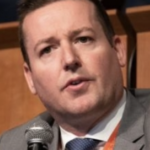Ahead of his appearance at Passenger Terminal Conference 2024 in Frankfurt, Germany, in April, Matthew Vaughan, director of aviation security and cyber at IATA, sat down with Passenger Terminal Today to reveal more about his upcoming panel discussion, “Is aviation security at a crossroads? Aviation security in a complex and integrated world”.
What do you plan to discuss in the panel?
At the conference, I’ll be talking primarily about security management systems (SeMS) and the need to drive performance culture in security. Over the course of my career, the nature of threats has largely influenced changes in aviation security and it’s arguable today that continues. As such we see reactive models in policy and security measures as opposed to performance and resilience based. Interference vectors like cyber and drones, which require an integrated safety and security management approach, are starting to change how regulators and industry achieve more from their security overhead. Hence why my presentation overall will be about leading the adoption of SeMS to continually improve and prove value through notions of performance.
In your view, what are the most important things to consider when developing an airport’s security today?
Passenger facilitation, or in this context, secured facilitation are the most important factors for airport security today. The application of security measures where they are needed the most – for 99.99% of travelers, light-touch, low screening is all that is ever required. Secondly, we see issues like complacency and access to skilled staff. If not managed, this will result in unacceptable vulnerabilities that may appear over time through cumulative effects.
 What emerging technology is playing a key role in these considerations for IATA?
What emerging technology is playing a key role in these considerations for IATA?
I am not sure if biometrics or the adoption of automation through AI is emerging anymore, but they do represent a great opportunity to address passenger facilitation aspirations. ICAO guidance currently has the passenger journey not exceeding 60 minutes. In our view at IATA, that is way too generous. Especially when some airports sell minimum connection times below 45 minutes. If technology can improve service levels, then we are all for the adoption and implementation.
What are the top three trends shaping the sector at the moment?
The nature of threats (known and unknown), automation and the growing need to ensure that year upon year of seemingly sunken security costs, both OPEX and CAPEX, actually are subject to some form of rigor and performance management. Security managers are well aware of classical notions about the proverbial “necessary evil”. This needs to change and pivot toward performance management culture.
Is there anything else you’d like to add?
The international security environment is certainly being challenged currently. It is not the time to be horse-trading on what security measures make up the ICAO baseline. Specifically, this is important to consider when we maintain that aviation security – like counter-terrorism arrangements – is a government responsibility. However, security is more integrated than that and where industry plays a role, this must be recognized via security management system approaches. We detailed these considerations further in our recent inaugural release of the IATA Annual Security Report.
To hear more valuable industry insights from top aviation executives, book a conference pass for Passenger Terminal Conference, April 16-18, 2024, in Frankfurt, Germany.



